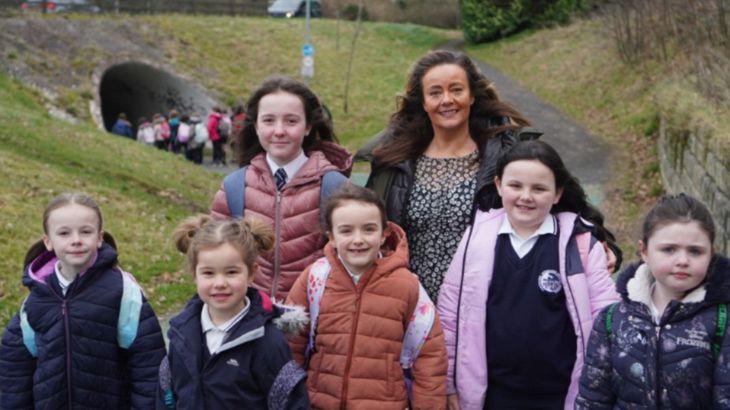Two walking buses provided by Portadown Integrated Primary School in Northern Ireland are proving how popular and fun active travel to school can be when surrounded by safe infrastructure.

Some of the pupils from Portadown Integrated Primary School who enjoy one of the ‘walking buses’ to and from school every day, accompanied by member of staff, Alex Davison. Credit: Dave Wiggins
Portadown Integrated Primary School (PIPS) started offering pupils the staffed ‘walking buses’ shortly after joining the Active School Travel Programme in 2015.
The children gather at two designated spots and school staff chaperone them on the walk to school.
The team in Northern Ireland has been delivering its behaviour change programme, which encourages walking, wheeling and cycling, since 2013.
The programme is funded by the Department for Infrastructure and the Public Health Agency (PHA).
Through it, more than 460 schools have participated to date.
Practice the active travel message
Dave Wiggins is Active Travel Officer for schools in the south east region and he is delighted to see the PIPS pupils and staff practice the active travel message.
Their walking buses take advantage of the nearby Craigavon Community Greenway, a traffic-free network which runs between Portadown and Lurgan.
Dave said:
“In September 2015 when I first sat down with the school Principal, Mr Feargal Magee, he explained that the school was growing very quickly from one class of each year group to two.
“With so many cars arriving, this was creating a congestion issue outside the school and causing tension with residents in a built-up housing area.
“He wanted to see more families leave their cars at home and instead enjoy the benefits of active travel.
Benefits such as improved physical and mental health, money-saving and arriving at school alert and ready to learn, as well as making the area around the school safer and less polluted at peak times.”
Working together to find starting points
Mr Magee, Principal of Portadown Integrated Primary School, said:
“We recognised that many families who lived a little further away from the school needed to start the journey by car.
"But we worked with Sustrans to highlight some places approximately a 15-minute walk away where the driver could park their car safely and walk the pupils round to school.
“This kept some of the cars away from the school gate but we felt it didn’t go far enough.”
Within a short period of time, the school had set up Northern Ireland’s first two daily staffed walking buses, approaching the school from opposite directions each morning.
Significant change in travel behaviour
PIPS has seen a significant change in travel behaviour with many more pupils and families now walking, cycling and scooting to school together on a regular basis.
This has reduced the number of cars outside the school gate and created a community atmosphere where people have time to chat together.
Dave Wiggins added:
“It is amazing that after eight years, PIPS is still running its two staffed walking buses every morning, giving its pupils the best opportunity to actively travel to school.”
Active School Travel report 2021-22
Portadown Integrated Primary School is just one of the success stories of the Active School Travel programme as the results from the latest report show.
The 2021-22 review revealed that at the end of the school year, the number of children travelling actively to participating schools increased from 30 per cent to 41 per cent.
While at the same time, the number of pupils being driven to school fell from 62 per cent to 51 per cent.
While nearly half of Northern Ireland’s primary school pupils live less than a mile from their school, almost two-thirds are driven the short distance.
But our survey shows around four out of every five children would like to make that journey by walking, wheeling, scooting or cycling.
Central to supporting this behaviour change is better infrastructure to make active journeys a safe option and therefore more attractive to parents, as demonstrated by Portadown Integrated Primary School.
Chief Medical Officer's guidelines
Dr Hannah Dearie from the Public Health Agency said:
“We are delighted to work in partnership with the Department for Infrastructure and Sustrans on the Active School Travel programme.
"The programme is designed to help increase physical activity levels, in line with Chief Medical Officer’s guidelines.
"The programme is fun, safe and interactive and has far-reaching benefits to support children throughout the life course.”
Interesting insight
- In the 2021-22 school year, 437 schools across Northern Ireland participated in the programme, with 209 receiving direct support from an Active Travel Officer and 228 schools receiving ongoing, light touch support in the Extended Support network.
- At the end of the 2021-22 school year, the number of children travelling actively to school at participating schools increased from 30% to 41%.
- At the same time, the number of pupils being driven to school fell from 62% to 51%.
- After one year in the programme, the number of children being physically active for at least 60 minutes each day increased from 28%t to 36%.
- While 41% of pupils now usually travel actively to school, as many as 79% would like to.
Find out how you can get involved in the Active School Travel programme.
Learn more about our work in Northern Ireland.





